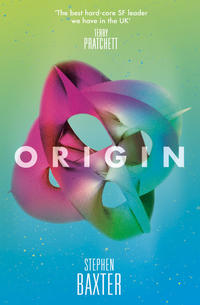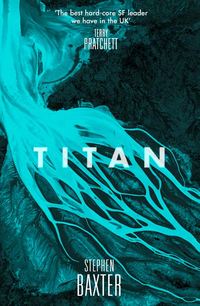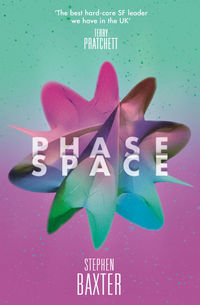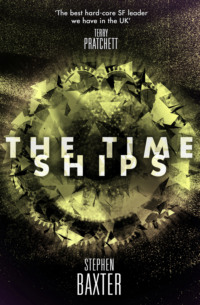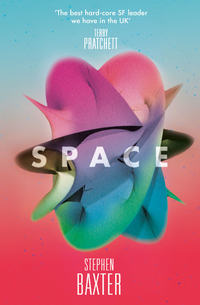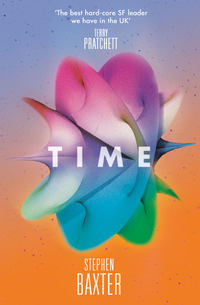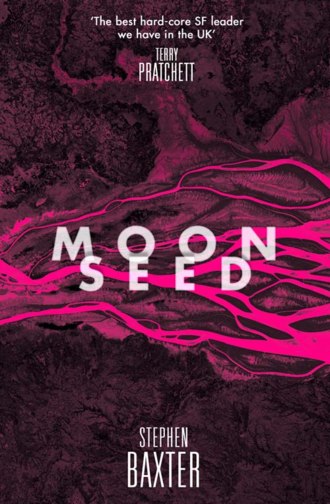
Полная версия
Moonseed
… And to Debbie Sturrock, a trainee firefighter based along the coast in Dunbar, Venus was invisible, a light in the sky masked by the tower of flame she and her fellow students were trying to control, under the growling command of an unsympathetic station master. Fire in the sky meant nothing when you were confronted by fire on Earth …
… And in Glasgow, Scotland’s biggest city, Jenny Calder had tried to follow the news – she had been interested in astronomy and science and stuff as a kid, and the Venus incident was strange and somehow disturbing – but now the kids were fighting again, this flat in the Gorbals, renovated or not, was just too small for all of them, and William, her husband, was worrying that if his new employers found out about his record he’d be kicked off the oil rig again, and so she pushed her hair from her eyes and stumbled from crisis to crisis, never quite falling over, and Venus was just too far away and too strange to deserve her attention …
… And around the world, in the US, an Air Force pilot called Garry Beus test-flew an enhanced F-16 over the baked desert of California and looked up at Venus, smeared and distorted by his canopy in an eggshell sky, and thought with wistful sadness of his dying mother Monica, and how she must be fascinated by this … And in Los Angeles, a journalist called Joely Stern, dismayed by yet another rejected job application, stared up at a Venus made Mars-red by filthy LA smog, and she stared at it, wishing she was up there, up in space, anywhere but here …
… And in Japan, a geologist called Blue Ishiguro watched the evolving light in the sky, fascinated, and wondered if he should call his friend Henry Meacher at NASA who might know more about this – but then he’d heard Henry was leaving NASA, not to mention Geena, and it mightn’t be a good time … And, atop a Japanese mountain called Nantai, a Buddhist monk – originally from Ireland, called Declan Hague – stared at the strange light and wondered what it might mean for his self-imposed exile and the guilt that still racked him …
… All around the planet, as it turned in the wash of Venus light, human faces were lifted to the sky, shining in the strange light like coins in a well, amused or puzzled or wondering or indifferent …
… And in Houston, Tracy and Jays Malone spoke in hushed tones, so as not to wake the kids.
More than three decades after his Moonwalk, a few years into a whole new century, and here was Tracy with kids of her own, kids to whom Apollo was some sort of Cold War relic – not even that, something prehistoric and incomprehensible, something their grandfather had done. For somehow, as if mocking the old dreams, the space program had become a thing of the past, not the future.
But her name was undoubtedly, famously, written on the Moon – she’d seen photographs of it – and it would indeed be there for a million more years, less the few summers she had spent growing up since Jays came home.
So there had been only one place to come on this strange and cosmic night.
She stood with Jays on his verandah. It was just like all those years ago, except that now she cradled a pina colada in her hand instead of a soda.
And, in the dawn sky, there was a new light, which outshone even the battered old Moon.
‘Quite a night,’ said Jays, the light casting sharp point-source shadows on his face. ‘Quite a week, in fact.’
‘Yeah.’ So it had been, all of seven days after the Venus event first showed in the sky.
According to the TV there had been Venus-watching parties all over the US, a predictable run on telescopes and binoculars in the stores. The Hubble Web sites had crashed from the hit traffic, even though NASA hadn’t turned the Hubble that way yet.
She said, ‘Those guys on the TV, yammering about anti-matter comets and alien invaders. The most remarkable week since Neil Armstrong touched down on the Moon –’
‘Or since man came out of the caves. Makes you miss Cronkite,’ he said, ‘and I’ve been further out of the cave than most.’
The heatless light of dying Venus made her shiver. ‘So what do you think has happened up there, Dad?’
‘Danged if I know.’ His voice was light, but his face was a mask, expressionless. ‘I don’t think it’s a good omen, though.’
And that made her more queasy than all the fantastic speculations of the TV pundits.
He touched her arm. ‘Come on. I want to show you something.’ He led her indoors, towards the lounge. ‘Something I never showed anyone. Not even your mother.’
‘Why not?’
He grinned, and put his beer down on top of the piano. ‘Because it’s a federal offence.’ He started to rummage at the back of a dresser drawer.
She looked around the room. So familiar, nothing changed since she was a kid, it was like being transported back in time. It was an old guy’s trophy room, with Jays’s photographs of airplanes and spacecraft, a whole-globe view of Earth taken with a hand-held Kodak, a little framed patch of spacesuit, grey with Moon dust. But everything was old and faded. Even the spacesuit piece looked like it had come over on the Mayflower.
Jays approached her. He was carrying something in a fist-sized plastic envelope. The plastic had gone yellow and brittle with age. In the gathering dawn light, she could see it held a piece of rock, black as tar.
‘Oh, Dad. Is that what I think it is?’
‘It’s a piece of bedrock, sweet pea. It froze out of a lava flow, that bubbled out of the Moon more than three billion years ago …’
It was, of course, Moon rock.
‘Are you supposed to have that?’
He grinned, his teeth white in Venus light. ‘Hell, no. I told you. It’s a federal offence. I grabbed it when I was deep inside the rille, out of sight. They never missed it. Our documentation wasn’t worth jack shit anyhow. I wanted to leave it to you and the kids. So I will. I never even took it out and looked at it before, all these years. Come on.’ He stepped towards the porch.
The eastern sky, behind the house, was growing pink, but the Atlantic behind them was a mass of darkness still. Jays found a place to hold his rock so it cast two shadows in his hand, from sun and Venus.
‘It looks like coal,’ she said.
He laughed. ‘The Moon is dark. If it was bright as Earth, acre for acre, you could read by its light. But you’d never see the stars …’
There was a sharp smell. Like before a storm. Or like a beach.
‘Dad, what’s that?’
‘What? …’ But now his older senses registered it. ‘Ozone. Electrical fire.’
We’re not in a spacecraft now, dad, she thought. But still, maybe she should go get the kids –
Jays dropped the rock – it thumped dully on the wooden patio – and he tucked his hand under his arm. ‘Jesus, that’s hot.’
2
The day of Geena’s post-flight press conference was, it turned out, the last day Henry would spend in Houston. So Geena, with a sinking heart, realized she had no excuse to duck out of seeing him, one last time.
She drove the couple of miles to the Johnson Space Center from their abandoned Houston home, in the decaying 1960s suburb of Clear Lake. On NASA Road One, she found herself queuing in a bumper-to-fender jam. Once more, NASA Road One was being rebuilt; it was choked by huge, crudely-assembled contraflows, and the multiple surfaces made ramps that slammed into the suspension of her Chevy.
The short drive took her the best part of an hour, and she had no option but to sit there with her starched collar itching at her neck, the skirt of her suit riding up around her knees.
At length she crawled past the wire fence that separated JSC from the rest of the world. Through the chicken wire she could see the JSC buildings, black-and-white cubes scattered over the old cow pasture, looking small and cramped and closed-up, out of place in an era when every office building was a glass-walled rhomboid.
She tried the radio. Every station she found seemed to be playing country music, the modern stuff that sounded to her like soft rock. The DJs harangued her about a write-in campaign to have TNN – The Nashville Network, country music TV – retained by the local cable company. She flipped around to another station, 93.7FM, which seemed to play nothing but ‘fun oldies’. They had a policy of no repeats during a single day, and on Sunday mornings, she learned, she could enjoy breakfast with the Beatles. The music, every track of which she’d heard before, was depressing Boomer stuff, and sounded much worse than she remembered; it made her feel very old.
At last she found a news channel, and listened to an earnest debate about whether ebonics should be allowed in schools, and an ill-informed discussion about the latest news from Venus.
She had flown in space on four missions now: two Shuttle missions and two stays on Station. Her last Shuttle flight had finished a month ago, just before the Venus event. And every time she returned to this – from the black silence of space, the simplicity of her life and objectives up there – she felt depressed as all hell.
The traffic lurched forward in spasms.
She’d made Houston her home for ten years now, but she was San Francisco born and bred, and she’d never quite gotten used to Texas. Houston was hot and flat, water towers and shining green lawns and under-used malls that sprawled untidily around the downtown towers poking out of the city’s heart. Houston was new, its growth fuelled mostly by oil money, but it was half-empty and soulless.
Oh, Houston could give you its moments – driving around the Loop you would sometimes get a fine view of the Port of Houston, refineries draped in feathers of steam, lights on the stacks glowing yellow – but then she’d never had an ambition to live in a Blade Runner diorama.
And this area, Clear Lake/NASA, was really pretty seedy. It was a long way out of downtown Houston, off the Galveston Freeway, I-75. The Johnson Space Center was the home of the nation’s space program, but at heart it was just an old-fashioned government facility, fading 1960s buildings stranded in an area full of desolate mini-malls and little else.
But even so, she thought, maybe it wasn’t Houston’s fault she felt so sour about life here.
It would be better when Henry had gone: Henry, ex-husband of three days, the living, breathing embodiment of everything that had gone wrong with her life.
As she approached the JSC entrance, she realized she wasn’t up to facing the press, or Henry. Not just yet.
She pulled into a parking lot close to the Days Inn NASA, a chalet-style motel almost directly opposite the JSC entrance. She used to stay here when she was an impoverished ascan, an astronaut candidate, in happier days a hundred years ago. Near the Days Inn was the Puddruckers hamburger restaurant where she used to eat, and a Chinese restaurant. She bought a Houston Chronicle, 50c from a vending machine, and walked into the Chinese. It was full of old folks watching TV, and she bought herself soup and a sandwich for $2.95.
The Chronicle was stuffed full of ad sections and bewilderingly dull local news. But it had reasonable coverage of the space program, especially when a mission was in progress, with two or three features a day. A lot more informative than NASA TV, she thought.
Her soup arrived. When she looked up, past the middle-aged waitress, she could see spacecraft, the superannuated inhabitants of JSC’s rocket garden, poking above the trees like minarets from some ruined temple. And there was the white-and-black flank of the Saturn V, an operational Moon rocket, lying in the grass.
In the Chronicle there was a series of ads for stomach stapling, aimed at those more than a hundred pounds overweight. Americans always eat too much, Arkady often told her. Maybe she’d clip this out to show him.
She ate her soup, trying to make it last.
Through the JSC security gate she parked her car. It was a late February day, unusually cold. She walked to where Henry would be working, at the Lunar Curatorial Facility in Building 31N. This was the building where, for thirty years, they had stored the Moon rocks.
She had to climb two and a half storeys. The height was for protection against Class 5 hurricane floods; Mission Control was raised to this level for a similar reason. The weather was thought to be the most likely danger to the rocks, in these post-Cold War days. But just in case of a nuclear attack or similar catastrophe, a proportion of the irreplaceable samples were stored in Brooks Air Force Base at San Antonio, separation being the only defence in case of such a disaster.
To be destroyed in such an attack would have been a strange fate for the battered old rocks which had seen so much, she thought.
She found a friendly technician who would take her in. The woman had worked here for twenty years. The tech was pregnant. That struck Geena as odd: what a start to life, here in the Moon rock lab, halfway off the Earth.
She had to go through the clean room. In an outer changing room she put on a bunny suit: two layers of overshoes, and a button-up white coat and McDonald’s-server hat. The garments were labelled ‘Lockheed Martin’. There were no gloves, but she had to take off her wedding ring – gold evaporating from its surface could contaminate the samples – and when she slipped it into a pocket she realized, for the first time, she needn’t put it back again.
Then the two of them crowded into an airlock, a little two-doored glass-walled room little bigger than a phone booth. Air blowers blasted at them from the ceiling.
The tech opened an inner door, and there she was, in the same room as the most famous rocks in the world.
And Henry.
The lab was a place of rectangles, of big stainless steel glove boxes and staff in white clean-room coats and hats and overboots. The roof was crowded with fluorescent tubes which filled the room with a sickly grey light, a greyness emphasized by the polished steel of the glove boxes and the nondescript floor tiles. At the back of the room, a heavy door led to a vault where the bulk of the lunar samples were stored.
This lab didn’t do much original science, in fact. It was really just a service lab, providing sample processing for external researchers. The cleanness standard was tighter than an operating room, though not so tight as, for example, a microelectronics lab.
There was a tour going on, bigwigs garbed out in their white coats, having their photographs taken with the rocks, enduring a running commentary from some flack in a white coat and a trilby.
… Eight hundred pounds of Moon rock is stored here, as two and a half thousand samples, split into eighty thousand subsamples. Something like a thousand samples a year are taken, mostly less than one gramme. The subsamples are stored in nitrogen, in triple-shelled containers. Efforts are made to reuse the samples, even ones which have been driven to destruction in some way – it is possible that other unrelated tests could be performed even on the detritus. There is a computer database on all eighty thousand subsamples, and handwritten notes and photographs on each one are stored in a fire-proof vault. Even today, sixty per cent of the samples have remained unopened since they were locked up on the dusty surface of the Moon …
The receiving lab had been built at the height of the Cold War Apollo era, when funds flowed relatively freely, and everyone worried that there might be bugs in the Moon rocks, that would devastate the world. But the Moon rocks had turned out to be the deadest things ever seen.
She could see Henry at the far end of the room.
He was obviously busy, organizing the packaging of some precious rock or other. He was clustered around a stainless steel workbench with three or four techs, all of them in their white bunny suits, like a conference of surgeons.
She drifted to the front of the lab, and waited until Henry came free.
At the front of the room was a glass wall, beyond which was a viewing gallery, dimly lit.
And here there were three big rocks on display. Each of them was maybe the size of a grapefruit, sawn in half.
These were Moon rocks, she knew.
She’d been with Henry long enough to pick up, however reluctantly, a little geology. The rock on the left was obviously a basalt – a kind of lava – a dark grey structure shot through with vesicles. The rock on the right was a breccia, its structure compound like a granite, big shapeless blobs of different materials. Breccias were the result of violent events, which smashed up rocks and welded them back together again. On Earth they usually formed in river environments. But these lunar rocks had been shoved together by an ancient meteorite impact which pulverized some part of the Moon. Even that impact was more than three billion years ago, older than almost all rocks on Earth. And the centre rock, perhaps the most nondescript, was all of four and a half billion years old.
‘… Treat that with respect, Geena; it cost forty billion bucks.’
It was Henry, of course, his fleshy nose like a bird’s beak, his black hair an unruly tangle that wouldn’t stay put under his NASA-regulation trilby.
Geena said, ‘I thought I ought to –’
He talked fast. ‘What? Come say goodbye? Gee, thanks. You want to see 86047? That’s the rock I’m taking to Edinburgh. Or rather, it is taking me. The only piece of lunar bedrock you’re likely to see. What an honour. And the centrepiece of what’s left of my career.’ He eyed her. ‘Maybe you’d like to stomp it, like you stomped my balls.’
She stepped back, until her butt came up against the display case of Moon rocks. She hadn’t expected so much anger; it was like an explosion in her face.
‘Change the record, Henry. You aren’t good at bitterness.’
‘You think I’m giving you a hard time?’
‘I don’t deserve it.’
‘Like hell. You shafted the Shoemakers. We were going to the South Pole,’ Henry said. ‘A place your Man-in-Space heroes had never dared think about. Great science, and two probes for two hundred million bucks apiece. Christ, do you know how much we could have learned?’
‘I know, Henry.’
‘Do you? Listen to me – there’s water at the South Pole. Not just the bathtub full that Prospector found, but a whole frozen ocean of it, laid down by the comets, in great dusty layers, carbon dioxide too, maybe enough to flood the whole damn Moon –’
‘I know, Henry. And your fancy probes would have performed the deep core sampling that would have proved it. You told me a dozen, a hundred times. You told everybody else. Maybe –’
‘Maybe what?’
Maybe if you didn’t shoot your mouth off so much, to me and the NASA managers and on the TV chat shows and in the tabloid papers and in the goddamn JSC staff canteen, you’d exert a little more influence. Maybe this wouldn’t have happened to you.
Suddenly, she felt weary of all this. ‘You do blame me, don’t you?’
‘Hell, yes. If you hadn’t come out publicly and backed shutting down Shoemaker …’
‘It wouldn’t have made a difference. Don’t you get it? It’s all about money and politics and power and rivalry between the NASA centres, Henry. It’s a game, that you never figured out.’
He thought about that. ‘So what game were you playing? If it made no difference what you said, why say anything at all?’
‘I was trying to advance my career. What else?’
‘At my expense?’
‘Look, Henry, it could be worse. You got your lunar bedrock, haven’t you? The most important unanalysed Apollo sample left, so they tell me.’
‘86047? It’s a piece of shit.’
‘How can you say that? It’s bedrock.’
‘But that asshole Jays Malone didn’t do his documentation right. I don’t have the context.’
She knew enough geology to understand him. The geologists had been complaining about the astronauts’ performance on the Moon since 1969. Without its context – knowing exactly where a sample had come from, how it was positioned, all the rest – a rock’s value was hugely diminished, for a geologist. Maybe that was why they fobbed off Henry with it.
He was still talking.
‘… And I have to go to Edinburgh to work on it. The only place that would have me.’
‘Come on, Henry.’
‘Where the hell is Scotland anyhow?’ He waved an arm vaguely. ‘Some Scandinavian country, thataway somewhere.’
‘You need a change, Henry. A career break. Face it. All this bitterness –’
‘The thing of it is, we’ll never know. Don’t you get it yet, Geena? We’ll never know, about the South Pole ice. Not in my working lifetime. That’s what is killing me.’
She tried to focus, to stay sympathetic, but her attention drifted.
She’d heard this before, too.
Was this the definition of the end of a relationship? When you’ve heard everything the other person has to say – not once, but many times?
She started to think ahead to her appointments later in the day.
Henry had, she realized guiltily, stopped talking.
He turned, and walked back to his work.
The Shoemaker had been Henry’s project, the centrepiece of his career. It had actually got further than most. Two prototype landers had been built for real, by the Jet Propulsion laboratory out in Pasadena. Now, as far as she knew, they were being put in storage, or maybe cannibalised for other missions …
For the Shoemaker program had been canned. The manned program – delays to the Space Station, cancellations by the cash-strapped Russians – had taken too much out of NASA’s budget.
It had always been thus, Geena knew. A single Shuttle launch, of whatever value, cost as much as both Henry’s unmanned science missions put together.
The project on 86047 was no sop, though. The mother rock was being broken up and sent around the world to top geophysics labs for independent analysis. Edinburgh was just such a lab. They’d done the same, for instance, with the famous meteorite from Mars which had looked as if it held life traces; Edinburgh had got a piece of that too.
And Henry was being sent along with the rock. There was valuable work to be done here, genuine research. But …
But she’d been with him long enough to understand how he felt.
The cancellation of Shoemaker was like the cancellation of his whole career; it meant he wasn’t likely to meet the long-term objectives he had set himself, like all scientists, objectives which underlay his choice of particular projects.
Digging aimlessly into 86047 was, by comparison, no consolation.
The visitors were still here. A tech opened a cylindrical case inside a glove box, and pulled out a Moon rock: small, fist-sized, nondescript, sawn in half. Geena could see the vertical burns of the saw. The visitor had his picture taken with it, his grinning face outside the glass, the rock held by a black-gloved hand inside the glass, the camera angled so as to avoid the flash’s reflection from the glass.
And in the sterile light of the lab, the ancient rocks from the Moon – many of them older by a billion years than any rock that had survived on Earth – sat, wizened and lumpy and wilfully irregular, like resentful old men in a rest home.
3
Monica Beus was with Alfred Synge, on the Hawaiian island of Oahu.
She emerged from the dark crater into the blinding light of the sun. She pulled on her sunglasses and checked her floppy hat. She’d snapped Alfred’s head off when he showed up with this big hat for her. For the sun, he said. But he was right, of course; the chemotherapy had left her so bald her scalp would fry like an egg, and she was too damned stubborn, naturally, to wear a wig.


